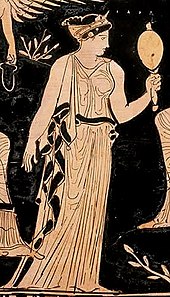| Revision as of 14:15, 9 November 2007 edit72.186.213.96 (talk) see discussion page← Previous edit | Latest revision as of 23:04, 20 October 2024 edit undoMonkbot (talk | contribs)Bots3,695,952 editsm Task 20: replace {lang-??} templates with {langx|??} ‹See Tfd› (Replaced 2);Tag: AWB | ||
| (78 intermediate revisions by 53 users not shown) | |||
| Line 1: | Line 1: | ||
| {{short description|Greek goddess of recuperation from illness}} | |||
| ⚫ | {{Greek |
||
| ] | |||
| ⚫ | '''Iaso''' ({{IPAc-en|ˈ|aɪ|.|ə|s|oʊ}}; {{langx|el|Ἰασώ}}, ''Iasō'') or '''Ieso''' ({{IPAc-en|aɪ|ˈ|iː|s|oʊ}}; {{langx|el|Ἰησώ}}, ''Iēsō'') was the ] of recuperation from illness. The daughter of ], she had four sisters: ], ], ], and ]. All five were associated with some aspect of health or healing. For more information on the ] of Iaso, see ]. | ||
| ⚫ | '''Iaso''' ('' |
||
| ] | |||
| ==Description== | ==Description== | ||
| ⚫ | Pausanias (author of '']'') wrote this of ] in ], ], in the 2nd century A.D.: | ||
| Very little is actually known about Iaso. She was probably considered a ], unlike her sister Panacea, who was given full "god" status. She did, however, have followers, the Iasides ("sons of Iaso").{{fact|date=November 2007}} | |||
| ⚫ | <blockquote>The altar shows parts. One part is to ], ], and ], another is given up to heroes and to wives of heroes, the third is to ] and ] and Amphiaraus and the children of ]. But ], because of his treatment of ], is honored neither in the temple of Amphiaraus nor yet with Amphilochus. The fourth portion of the altar is to ] and Panacea, and further to Iaso, Hygeia, and ]. The fifth is dedicated to the ]s and to ], and to the rivers ] and ].</blockquote> | ||
| ⚫ | |||
| ⚫ | ] mentions Iaso humorously in '']'', when one of the characters, Cario, reports that Iaso blushed upon his passing gas. | ||
| ⚫ | <blockquote> |
||
| In the temple of Amphiaraus at Oropus a part of the altar was dedicated to her, in common with Aphrodite, Panaceia, Hygieia, and Athena Paeonia. | |||
| ⚫ | ] mentions Iaso humorously in '']'', when one of the characters, Cario, reports that Iaso blushed upon his passing gas. | ||
| Iaso had many children. | |||
| ==The Name== | |||
| {{clear}} | |||
| ⚫ | ==References== | ||
| Dozens of internet religious sites both Jewish and Christian have noted and discuss the fact that the Ionian genitive form of the name ''Iaso'' is ''Iesous'' which is the ancient Greek name for Jesus. In addition, the 19th century ] ] had also argued that the genitive of the ] spelling of Iaso was the source for the name ].<ref></ref> ''Iesous'' is indicated to be the genitive of Iaso by Liddell and Scott (p.816). | |||
| ⚫ | *{{cite encyclopedia |last=Schmitz |first=Leonhard |editor=] |encyclopedia=] |title=Iaso |url=https://www.perseus.tufts.edu/hopper/text?doc=Perseus%3Atext%3A1999.04.0104%3Aalphabetic+letter%3DI%3Aentry+group%3D2%3Aentry%3Diaso-bio-1 |year=1867 |volume=2 |page=552 |publisher=Little, Brown and Company |location=Boston }} | ||
| == |
==External links== | ||
| *{{Commonscatinline|Iaso}} | |||
| * ] | |||
| ⚫ | ==References== | ||
| <references/> | |||
| {{Greek religion}} | |||
| ==Further reading== | |||
| ⚫ | {{Greek mythology (deities)}} | ||
| ⚫ | *{{cite encyclopedia |last=Schmitz |first=Leonhard |editor=] |encyclopedia=] |title=Iaso |url= |
||
| {{Authority control}} | |||
| ⚫ | ] | ||
| ] | ] | ||
| ⚫ | ] | ||
| ] | ] | ||
| ] | |||
| ] | |||
| ] | |||
| ] | |||
| ] | |||
Latest revision as of 23:04, 20 October 2024
Greek goddess of recuperation from illness
Iaso (/ˈaɪ.əsoʊ/; Greek: Ἰασώ, Iasō) or Ieso (/aɪˈiːsoʊ/; Greek: Ἰησώ, Iēsō) was the Greek goddess of recuperation from illness. The daughter of Asclepius, she had four sisters: Aceso, Aegle, Hygieia, and Panacea. All five were associated with some aspect of health or healing. For more information on the genealogy of Iaso, see Panacea.
Description
Pausanias (author of Periegesis of Greece) wrote this of Amphiaraus in Oropos, Attica, in the 2nd century A.D.:
The altar shows parts. One part is to Heracles, Zeus, and Apollo Healer, another is given up to heroes and to wives of heroes, the third is to Hestia and Hermes and Amphiaraus and the children of Amphilochus. But Alcmaeon, because of his treatment of Eriphyle, is honored neither in the temple of Amphiaraus nor yet with Amphilochus. The fourth portion of the altar is to Aphrodite and Panacea, and further to Iaso, Hygeia, and Athena Healer. The fifth is dedicated to the nymphs and to Pan, and to the rivers Achelous and Cephisus.
Aristophanes mentions Iaso humorously in Ploutos, when one of the characters, Cario, reports that Iaso blushed upon his passing gas.
In the temple of Amphiaraus at Oropus a part of the altar was dedicated to her, in common with Aphrodite, Panaceia, Hygieia, and Athena Paeonia.
Iaso had many children.
References
- Schmitz, Leonhard (1867). "Iaso". In William Smith (ed.). Dictionary of Greek and Roman Biography and Mythology. Vol. 2. Boston: Little, Brown and Company. p. 552.
External links
 Media related to Iaso at Wikimedia Commons
Media related to Iaso at Wikimedia Commons
| Ancient Greek deities | |||||||||||||
|---|---|---|---|---|---|---|---|---|---|---|---|---|---|
| Early deities | |||||||||||||
| Titans |
| ||||||||||||
| Olympian deities |
| ||||||||||||
| Water deities |
| ||||||||||||
| Personifications |
| ||||||||||||
| Other deities |
| ||||||||||||